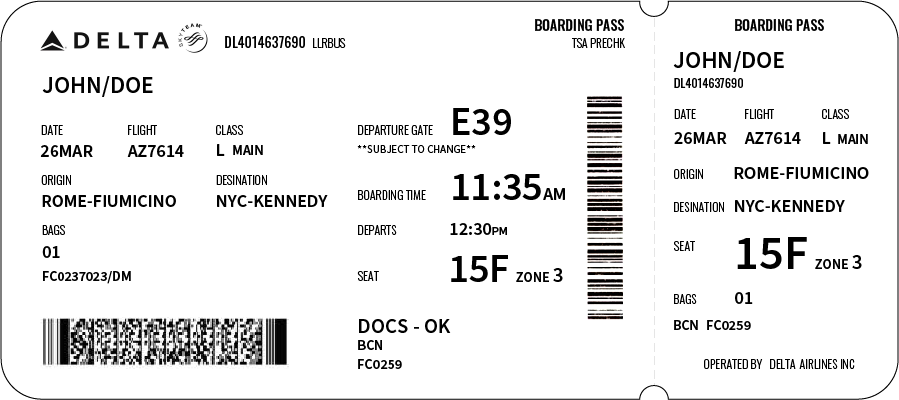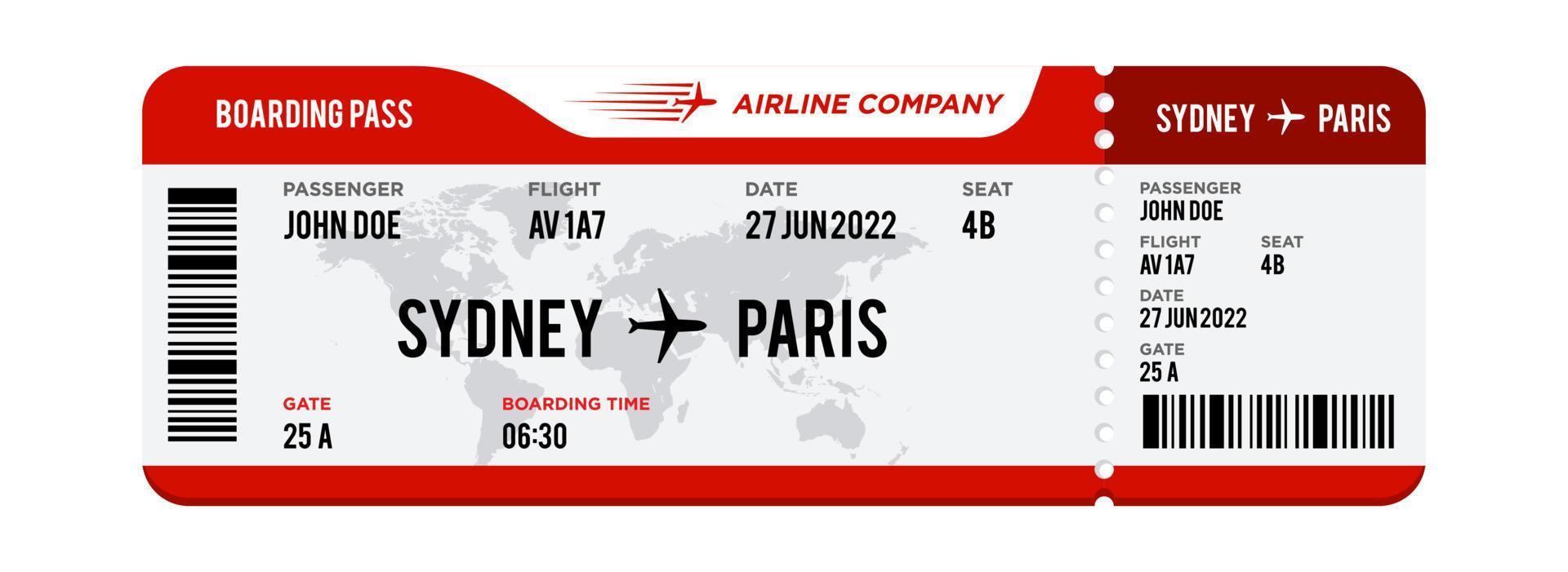Identity theft is common across several industries, including aviation. Losing passports or collecting their data in other ways creates an environment that could abuse the rights of traveling individuals.
Losing a Boarding Pass
If a passenger loses their boarding pass pre-flight, they may be inconvenienced by a canceled or stolen flight by a person who acquires it in any case. The criminal could also pass to areas only the passenger who booked the flight can access. However, an identity thief willing to go through any steps to actualize the crime can enter the ticket information on the airline's website to get personal information. The information in possible danger could be the frequent flyer account, that flight's destination and origination, and the class chosen for the designated flight. All of this information could be enough for the initiation of identity theft.

The ground personnel may forget to check a passenger's ID at the flight gate, which could result in the other person who found the ticket taking the flight. Passengers should keep the boarding pass secure and not leave it unattended to avoid this occurrence. After the flight, they can rip it into pieces before throwing it away. Sharing the boarding pass on social media is not recommended, as it could cause the spreading of personal information with individuals who could use the personal information for malicious purposes. Mobile boarding passes are more secure, considering these cases.
The information that is accessible through the boarding pass barcode could include the following:
- The passenger's full name
- The flight's destination
- Airline customer number
- Record locator
- Possibly the phone number, email address, fare the passenger has paid, and last four digits of the credit card utilized to pay for the flight.

After further research on the passenger's social media accounts with the account number and the name, the thief may find their pet's name, family member names, and birthdate. This information may be used for resetting passwords, stealing miles, changing seats, and canceling flights. This information is accessible since there are easy-to-use apps that can scan the barcode of a boarding pass and reveal personal information.
Stolen Passport Information
In 2018, information on over five million passports from the data stock of the Marriott hotel chain was stolen. These kinds of instances worry passengers about personal crimes, which can be committed by the theft of personal information that has been leaked and stolen for fraud.
The leaked passport information could be sold on the dark web for ranging prices. It changes according to the purpose and the acquired format. They can be digital scans, templates for creating a finished passport, and actual passports. The prices start from $5 and may go up to $5,000. Charles Henderson, who researches dark web forums (head of IBM's cybersecurity group X-Force Red), stated that "Criminals need, at the country they are leaving or entering, at a bare minimum passport number, name, date of issue, date of expiry, and sometimes the scan bar at the bottom of the passport."
It is easy to acknowledge if another party uses credit card information. However, passport information does not drop a notification like credit cards or provide a document designating that it has been used. Therefore, it is harder to understand if the information has been stolen for external use.
Risky Habits Benefiting Identity Thieves
The following habits can make passengers more vulnerable to identity theft:
- Posting about the trip's status: Posting the exact location and destination while on a trip may trigger some criminal acts since they are personal information on social media.
- Traveling with excessive documents: Leaving the documents that are not needed at home is important since many IDs carry personal information, which could be useful to access even more.
- Using public WiFi: Using public WiFi is dangerous since hackers might access information easily inside the passengers' phones.
- Leaving important information unlocked in a hotel room: It is always better to lock up important documents inside the hotel room to avoid spreading information.
Since social media is spreading and many websites are acquiring client information, it is important to be careful with the sharing process. Although it is impossible to stop the growth of the technological world, it is possible to prevent crimes by taking precautions.
"100% Preventable": NTSB Blames Systemic FAA Failures for Fatal DCA Midair Collision in Final Report » American Airlines Doubles Down on Premium Offerings to Offset Stormy 2026 Outlook » Washington D.C. Activates "Athena" Sensor Web to Shield National Capital Airspace »
Comments (1)
 Katrin zalewski
My name somehow gets used for travel
Katrin zalewski
My name somehow gets used for travel
Add Your Comment
SHARE
TAGS
INFORMATIONAL Hacker Theft Passport Crime Criminal InvestigationRECENTLY PUBLISHED
 Probe Into Catastrophic Air India Flight 171 Crash Leans Toward Deliberate Pilot Action Despite New Whistleblower Claims
In a significant and controversial shift for the global aviation community, investigators probing the June 2025 crash of Air India Flight AI171 are now focusing on deliberate pilot intervention as the primary cause of the disaster.
STORIES
READ MORE »
Probe Into Catastrophic Air India Flight 171 Crash Leans Toward Deliberate Pilot Action Despite New Whistleblower Claims
In a significant and controversial shift for the global aviation community, investigators probing the June 2025 crash of Air India Flight AI171 are now focusing on deliberate pilot intervention as the primary cause of the disaster.
STORIES
READ MORE »
 "Cancel Takeoff Clearance" Southwest Pilots Abort High Speed Takeoff to Avoid San Antonio Runway Collision
Federal authorities have launched a high-priority investigation into a "severe" runway incursion at San Antonio International Airport (SAT) that occurred on the afternoon of January 27, 2026. A Southwest Airlines Boeing 737 MAX 8 (B38M) was forced to perform an emergency high-speed rejected takeoff after a private turboprop mistakenly crossed into its path.
STORIES
READ MORE »
"Cancel Takeoff Clearance" Southwest Pilots Abort High Speed Takeoff to Avoid San Antonio Runway Collision
Federal authorities have launched a high-priority investigation into a "severe" runway incursion at San Antonio International Airport (SAT) that occurred on the afternoon of January 27, 2026. A Southwest Airlines Boeing 737 MAX 8 (B38M) was forced to perform an emergency high-speed rejected takeoff after a private turboprop mistakenly crossed into its path.
STORIES
READ MORE »
 Virgin Australia Ends Canberra International Drought with Historic Nonstop Bali Service
Residents of the nation’s capital are officially swapping their winter coats for boarding passes as Virgin Australia prepares to bridge the gap between the frosty Australian Highlands and the tropical shores of Indonesia. Starting June 22, 2026, Virgin Australia will become the only Australia-based carrier to operate international services from Canberra Airport, launching a highly anticipated nonstop link to Denpasar (Bali).
ROUTES
READ MORE »
Virgin Australia Ends Canberra International Drought with Historic Nonstop Bali Service
Residents of the nation’s capital are officially swapping their winter coats for boarding passes as Virgin Australia prepares to bridge the gap between the frosty Australian Highlands and the tropical shores of Indonesia. Starting June 22, 2026, Virgin Australia will become the only Australia-based carrier to operate international services from Canberra Airport, launching a highly anticipated nonstop link to Denpasar (Bali).
ROUTES
READ MORE »



